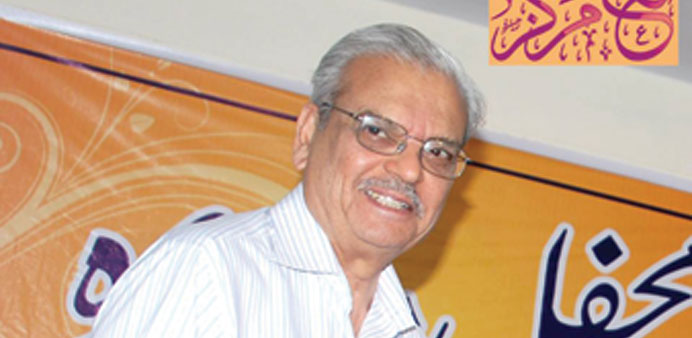ACCOMPLISHED: Dr Khursheed Rizvi is a poet, historian, research scholar and a prominent academic from Pakistan.
By Umer Nangiana
A multi-lingual poet, a multi-faceted scholar of oriental languages, an historian and a distinguished academic, Dr Khursheed Rizvi has made enormous contributions to literature and language in Pakistan. And he continues to do so with his poetry and his research on the origin, history and evolution of Oriental languages in particular.
He was recently awarded an ‘Aalmi Frogh-e-Urdu Adab Award’ (Award for promotion of Urdu Literature Worldwide) 2015 by the Qatar-based Majlis Frogh-e-Urdu Adab. And Dr Rizvi received the award at the associated Aalmi Mushaira (poetic symposium) where he recited his latest poetry to the Urdu-loving Doha audience.
Born in 1942 in Amroha, India, Dr Rizvi’s has spent his childhood in Montgomery (Sahiwal) in Punjab, Pakistan. He graduated from Government College, Montgomery in 1959. He moved to the University Oriental College Lahore for higher studies and did his MA in Arabic in 1961, winning a gold medal.
He did his PhD in Arabic from the University of Punjab in 1981.
“Coming from Amroha, Urdu was in my family. But, I have lived and studied in Punjab all my life so I have come to adopt the Punjabi culture and I have written poetry in Punjabi language as well. I developed my love for Urdu from my home though,” Dr Rizvi told Community, during a chat after receiving his award at the poetic symposium.
He said he received his first taste of poetry from his mother who used to keep a good collection of poetry and was well-versed in diction.
“My late mother was fond of poetry and used to read it to me in its true colloquial style. I think from there, I developed my initial interest in poetry and then I think it is something gifted also,” he recalls.
Dr Rizvi still remembers his first ever couplet that he had conceived one night gazing at stars and he was just 10 then. It went something like this, “Har shab ko hain falak par chamaktay huye taray, Khursheed nikalta hai to chup jatay hain saray (Every night the sky is full of shining stars, but they all hide when the sun rises).”
Dr Rizvi, who has received his education in Urdu from the best at some of the best educational institutions in Pakistan, says a strong affiliation with language is necessary for the social development of a society.
However, this bond is weakening among the younger generation of Pakistan, which he believes has been a victim of “commercialised education system.” While there are good emerging poets and writers in Pakistan, Dr Rizvi fears the country would lose them if the system is not mended.
“Teachers play a pivotal role in developing a child’s interest in his local language and literature which is his identity. Sadly, teachers today are not doing that job properly and we are seeing a youth that is disinterested in poetry and literature in their own language. I am sure most of them today would not be able to understand the poetry of Iqbal and Ghalib (legendary poets from the subcontinent),” says Dr Rizvi.
The scholar, in recognition of his service to Urdu, has received one of the highest civilian awards, Sitara-e-Imtiaz, given by the government of Pakistan. He has authored and edited books in many languages on a range of subjects.
Dr Rizvi also represents Pakistan in the Arabic Language Authority (Majma’ al-Lughah al-‘Arabiyyah) Cairo, Egypt. He is associated with the prestigious Government College University, Lahore as a Professor Emeritus.
His book “Arabi Adab Qabl az Islam” (Pre-Islamic Arabic Literature) is considered by critics as an authentic and invaluable introduction of Arabic literature in Urdu language.
Dr Rizvi has adhered almost entirely to teaching as a profession, which he considers his true passion.
He has served as principal of Government Ambala Muslim Collage Sargodha. In 1985 he proceeded on deputation to the Islamic Research Institute, International Islamic University, Islamabad where he served as Chief Bureau of Translation for six years.
In 1991 he became Head of the Department of Arabic at Government College Lahore (now a university), retiring in 1995.
Dr Rizvi is considered an authority on the ancient Arabic literature and manuscript editing within Pakistan as well as in the Arab world. He has performed the monumental task of editing, single-handedly, a rare peace of Arabic Literary history, which was lost in Baghdad at the time of the Hulagu’s attack on the city in 1258 which was later published by Sheikh Zayed Islamic Center in Karachi, Pakistan.

